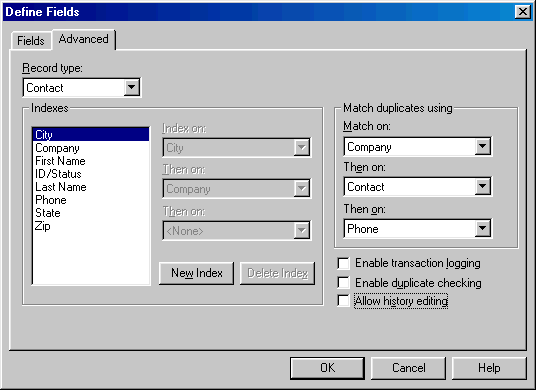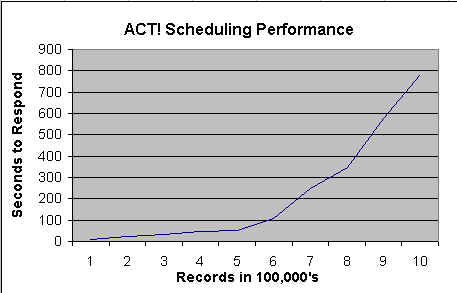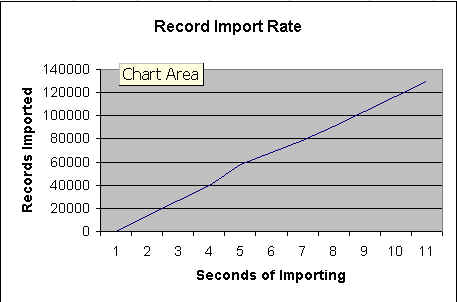In Edit, Define Fields, Advanced tab
Disable transaction logging
Disable duplicate checking (and resulting thousands of user confirmations)
Disable history editing

AbstractAn experiment was done to import 1 million records into ACT! to determine its capacity and performance. ACT! was able to import all the records and function without crashing. However, performance time was significantly degraded, especially on scheduling tasks. Record Import Rate (RIR) remained relatively constant during the import process. |
To determine what conditions may cause ACT! to cause file corruption, cease to function, or "explode"
ACT!'s response rate would decrease with the increase in number of records.
The record import rate would decrease as records are appended.
The database would retain all records without data loss.
ACT! is the best selling contact management software package. It uses the CodeBase database format, created by Sequitter Codebase Symantec switched from the FoxPro DBF format used in ACT! 1.0 and 2.0 versions. The DBF format is widely known as a stable data format. The CodeBase format was chosen for its increased flexibility in terms of number of fields per record, and its reliability.
Interact Commerce Corporation acquired the development and marketing rights to ACT! from Symantec in late 1999. ICC President Pat Sullivan was the inventor of ACT! for DOS in 1985, sold ACT! to Symantec in 1993, then bought it back in December 1999.
AST Premium Pentium III with 10 gigabyte hard disk
ACT! 2000 initial release by Symantec (ACT! is now owned by Interact Commerce Corporation)
Data files of random data
FoxPro program on ACTDEMO.DBF to character shift data by ASCII code
Database contained:
Contact records: 1,000,000
Activities records: 22
History records: 38 of which 12 were notes
Email addresses: 5
In Edit, Define Fields, Advanced tab
Disable transaction logging
Disable duplicate checking (and resulting thousands of user confirmations)
Disable history editing

File
Data Exchange
Import...
File Type: dBASE III-V
Contact records only
Map: basic address fieldsBegun: Friday 12 November 1999 20:43:00 pm
Finished: Sunday 14 November 1999 08:44:30 am
The data was intact, and records could be looked up reasonably quickly.
But Scheduling a Call, Meeting, or ToDo, it took an increasingly long time, displaying "Loading contacts..." for over 13 minutes before completely displaying the Scheduling Dialog and returning cursor and mouse control to the user.
.
| Records | Seconds | Minutes |
| 100000 | 10.93 | 0.18 |
| 200000 | 22.86 | 0.38 |
| 300000 | 33.80 | 0.56 |
| 400000 | 44.73 | 0.75 |
| 500000 | 50.69 | 0.84 |
| 600000 | 106.36 | 1.77 |
| 700000 | 250.48 | 4.17 |
| 800000 | 345.90 | 5.77 |
| 900000 | 577.50 | 9.63 |
| 1000000 | 783.00 | 13.05 |

Time in seconds to return cursor control to the user after activity scheduling dialog
| Records | Seconds | Minutes | Hours | Days | RIR/second |
| 0 | 0 | 0 | 0.00 | 0.00 | 0 |
| 100000 | 13469 | 224.48 | 3.74 | 0.16 | 7.42 |
| 200000 | 26938 | 448.97 | 7.48 | 0.31 | 7.42 |
| 300000 | 39807 | 663.45 | 11.06 | 0.46 | 7.54 |
| 400000 | 58176 | 969.60 | 16.16 | 0.67 | 6.88 |
| 500000 | 68445 | 1140.75 | 19.01 | 0.79 | 7.31 |
| 600000 | 78714 | 1311.90 | 21.87 | 0.91 | 7.62 |
| 700000 | 90783 | 1513.05 | 25.22 | 1.05 | 7.71 |
| 800000 | 103572 | 1726.20 | 28.77 | 1.20 | 7.72 |
| 900000 | 116271 | 1937.85 | 32.30 | 1.35 | 7.74 |
| 1000000 | 129690 | 2161.50 | 36.03 | 1.50 | 7.71 |

Average Record Import Rate - 7.51 records per second
The ACT! database was intact and stable at 1 million records and did not "crash."
However performance time was significantly degraded, especially on scheduling tasks. It took over 13 minutes for the Schedule Activities dialog to return control to the user at the 1 million record mark.
The Record Import Rate (RIR) remained relatively constant during the import process, disproving the hypothesis that the rate of record import would decrease as the database increased.
ACT!'s database structure is robust, and did not lose records due to the volume of contacts, supporting the hypothesis.
Submitted for publication in Easy ACT!, Pinnacle Publishing Company
Submitted to Technical Support at Interact Commerce Corporation
Submitted to CodeBase Technical Support
Equipment and resources sponsored by: ACT Consultants Association, Washington, DC